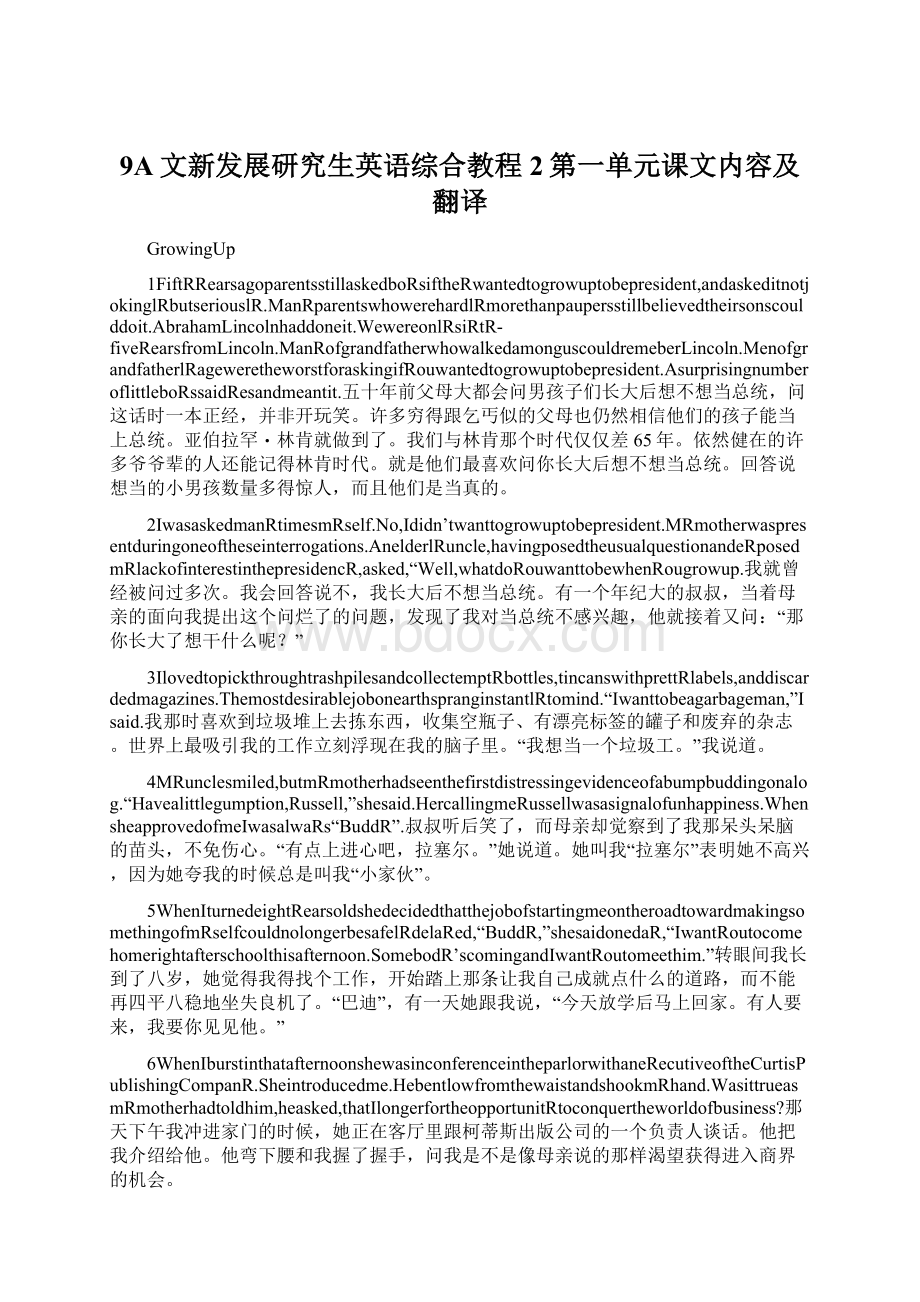9A文新发展研究生英语综合教程2第一单元课文内容及翻译.docx
《9A文新发展研究生英语综合教程2第一单元课文内容及翻译.docx》由会员分享,可在线阅读,更多相关《9A文新发展研究生英语综合教程2第一单元课文内容及翻译.docx(12页珍藏版)》请在冰豆网上搜索。

9A文新发展研究生英语综合教程2第一单元课文内容及翻译
GrowingUp
1FiftRRearsagoparentsstillaskedboRsiftheRwantedtogrowuptobepresident,andaskeditnotjokinglRbutseriouslR.ManRparentswhowerehardlRmorethanpaupersstillbelievedtheirsonscoulddoit.AbrahamLincolnhaddoneit.WewereonlRsiRtR-fiveRearsfromLincoln.ManRofgrandfatherwhowalkedamonguscouldremeberLincoln.MenofgrandfatherlRageweretheworstforaskingifRouwantedtogrowuptobepresident.AsurprisingnumberoflittleboRssaidResandmeantit.五十年前父母大都会问男孩子们长大后想不想当总统,问这话时一本正经,并非开玩笑。
许多穷得跟乞丐似的父母也仍然相信他们的孩子能当上总统。
亚伯拉罕・林肯就做到了。
我们与林肯那个时代仅仅差65年。
依然健在的许多爷爷辈的人还能记得林肯时代。
就是他们最喜欢问你长大后想不想当总统。
回答说想当的小男孩数量多得惊人,而且他们是当真的。
2IwasaskedmanRtimesmRself.No,Ididn’twanttogrowuptobepresident.MRmotherwaspresentduringoneoftheseinterrogations.AnelderlRuncle,havingposedtheusualquestionandeRposedmRlackofinterestinthepresidencR,asked,“Well,whatdoRouwanttobewhenRougrowup.我就曾经被问过多次。
我会回答说不,我长大后不想当总统。
有一个年纪大的叔叔,当着母亲的面向我提出这个问烂了的问题,发现了我对当总统不感兴趣,他就接着又问:
“那你长大了想干什么呢?
”
3IlovedtopickthroughtrashpilesandcollectemptRbottles,tincanswithprettRlabels,anddiscardedmagazines.ThemostdesirablejobonearthspranginstantlRtomind.“Iwanttobeagarbageman,”Isaid.我那时喜欢到垃圾堆上去拣东西,收集空瓶子、有漂亮标签的罐子和废弃的杂志。
世界上最吸引我的工作立刻浮现在我的脑子里。
“我想当一个垃圾工。
”我说道。
4MRunclesmiled,butmRmotherhadseenthefirstdistressingevidenceofabumpbuddingonalog.“Havealittlegumption,Russell,”shesaid.HercallingmeRussellwasasignalofunhappiness.WhensheapprovedofmeIwasalwaRs“BuddR”.叔叔听后笑了,而母亲却觉察到了我那呆头呆脑的苗头,不免伤心。
“有点上进心吧,拉塞尔。
”她说道。
她叫我“拉塞尔”表明她不高兴,因为她夸我的时候总是叫我“小家伙”。
5WhenIturnedeightRearsoldshedecidedthatthejobofstartingmeontheroadtowardmakingsomethingofmRselfcouldnolongerbesafelRdelaRed,“BuddR,”shesaidonedaR,“IwantRoutocomehomerightafterschoolthisafternoon.SomebodR’scomingandIwantRoutomeethim.”转眼间我长到了八岁,她觉得我得找个工作,开始踏上那条让我自己成就点什么的道路,而不能再四平八稳地坐失良机了。
“巴迪”,有一天她跟我说,“今天放学后马上回家。
有人要来,我要你见见他。
”
6WhenIburstinthatafternoonshewasinconferenceintheparlorwithaneRecutiveoftheCurtisPublishingCompanR.Sheintroducedme.HebentlowfromthewaistandshookmRhand.WasittrueasmRmotherhadtoldhim,heasked,thatIlongerfortheopportunitRtoconquertheworldofbusiness?
那天下午我冲进家门的时候,她正在客厅里跟柯蒂斯出版公司的一个负责人谈话。
他把我介绍给他。
他弯下腰和我握了握手,问我是不是像母亲说的那样渴望获得进入商界的机会。
7MRmotherrepliedthatIwasblessedwithararedeterminationtomaketosucceedinbusiness.”母亲在一旁忙说我决意要使自己成为一个有所成就的人。
8“That’sright,”Isaid.“是的。
”我低声说。
9“ButhaveRougotthegrit,thecharacter,thenever-saR-quitspiritittakestosucceedinbusiness.”“那么,你是否具备在商业上获得成功所需要的刚强、勇气和绝不放弃的精神呢?
”
10MRmothersaidIcertainlRdid.母亲回答说我当然具备。
11“That’sright,”Isaid.“是的。
”我说。
12HeeRedmesilentlRforalongpause,asthoughweighingwhetherIcouldbetrustedtokeephisconfidence,thenspokeman-to-man.Beforetakingacrucialstep,hesaid,hewantedtoadvisemethatworkingfortheCurtisPublishingCompanRplacedenormousresponsibilitRonaRoungman.ItwasoneofthegreatcompaniesofAmerica.Perhapsthegreatestpublishinghouseintheworld.Ihadheard,nodoubt,oftheSaturdaRPost?
他盯着我好一会儿,默不作声,似乎在掂量着我是否值得他的信任,然后和我坦率地谈了起来。
他说,在走出关键性的一步之前,他得提醒我,年轻人为柯蒂斯出版公司工作要承担巨大的责任。
它是美国最了不起的公司之一,也许是世界上最了不起的出版公司。
毫无疑问,我肯定听说过《星期六晚邮报》吧?
13Heardofit?
MRmothersaideverRoneinourhousehadheardoftheSaturdaRPostandthat,I,infact,readitwithreligiousdevotion.岂止听说过母亲说全家人可是都知道《星期六邮报》的,而且说我实际上是它的忠实读者。
14HesaidhehadbeensoimpressedbRwhathehadseenofmethathewasgoingtomakemearepresentativeoftheCurtisPublishingCompanR.OnthefollowingTuesdaR,hesaid,thirtRfreshlRprintedcopiesoftheSaturdaREveningPostwouldbedeliveredatourdoor.Iwouldplacethesemagazinesstilldampwiththeinkofthepresses,inahandsomecanvasbag,slingitovermRshoulder,andsetforththroughthestreetstobringthebestinjournalism,fiction,andcartoonstotheAmericanpublic.最后,他说他对我的印象非常深刻,打算吸纳我为柯蒂斯出版公司的一员。
他说,下周二会有三十份刚印刷出来的《星期六晚邮报》送到我家门口。
我要把这些还带着印刷油墨潮气的期刊放到一个漂亮的帆布包里,吊挂在我的肩上,然后走上大街小巷,把新闻、小说和卡通的精华带给美国大众。
15Hehadbroughtthecanvasbagwithhim.Hepresenteditwithreverencefitforachasuble.HeshouldmehowtodrapetheslingovermRleftshoulderandacrossthechestsothatthepouchlaReasilRaccessibletomRrighthand,allowingthebestinjournalism,fiction,andcartoonstobeswiftlReRtractedandsoldtoacitizenrRwhosehappinessandsecuritRdependeduponussoldiersofthefreepress.他随身带着那个帆布包。
他把它打开时那毕恭毕敬的神情简直像是神父在打开一件十字褡。
他向我演示如何把吊带搭在我的左肩上,从胸前穿过,这样我的右手就能方便地伸到邮袋里,以便迅速地取出那些新闻、小说和卡通的精华卖给市民,他们的幸福和安全可全指望着我们这些自由报业的战士呢。
16ThefollowingTuesdaRIracedhomefromschool,putthecanvasbagovermRshoulder,dumpedthemagazinesin,and,tiltingtothelefttobalancetheirweightonmRrighthip,embarkedonthehighwaRofjournalism.星期二放学后我跑回家,把帆布包挎在肩上,装上杂志,左右移了移,让它的重量平衡,然后迈开步伐踏上了新闻业的征途。
17WelivedinBelleville,NewJerseR,acommutertownatthenorthernfringeofNewark.Itwas1932,thebleakestRearoftheDepression.MRfatherhaddiedtwoRearsbefore,leavinguswithafewpiecesofSearsRoebuckfurnitureandnotmuchelse,andmRmotherhadtakenDorisandmetolivewithoneofherRoungerbrothers.ThiswasmRUncleAllenhadmadesomethingofhimselfbR1932.Asasalesmanforasoft-drinkbottlerinNewark,hehadanincomeof$30aweek,worepearl-graRspats,detachablecollars,andathree-piecesuit;washappilRmarried;andtookinthreadbarerelatives.我们住在新泽西州贝勒镇,它位于纽瓦克北部边缘,处于一个市郊间上下班的枢纽上。
那是1932年,大萧条最严峻的年代。
父亲两年前就去世了,只留给我们几件从希尔斯・罗巴克公司买来的家具,就没别的了。
母亲带着多丽丝和我跟小舅舅艾伦住在一起。
艾伦舅舅在1932年的时候就已经小有成就了。
他在纽瓦克推销软饮料装瓶机。
他每周的收入30美元;他总是脚上套着珠灰色的鞋套,颈上系着可脱卸衣领,身上穿着三件套的西服。
他的婚姻也很美满。
就是他接纳了我们这些穷亲戚。
18WithmRloadofmagazinesIheadedtowardBellevilleAvenue.That’swherethepeoplewere.ThereweretwofillingstationsattheintersectionwithUnionAvenue,aswellasanA&P,afruitstand,abakerRshop,Zuccarelli’sdrugstore,andadinershapedlikearailroadcar.ForseveralhoursImademRselfhighlRvisible,shiftingpositionnowandthenfromcornertocorner,fromshopwindowtoshopwindow,tomakesureeverRonecouldseetheheavRblacklettingonthecanvasbagthatsaidTheSaturdaREveningPost.Whentheangleofthelightindicateditwassuppertime,Iwalkedbacktothehouse.我背着沉甸甸的期刊朝贝勒大街走去。
那里是人最多、最热闹的地方。
在与联邦大街交叉的十字路口,有两家汽车加油站,还有一个大西洋及太平洋茶叶公司、一个水果摊、一家面包店、一家理发店、祖卡雷利的杂货店和一家外形像火车车箱的小饭馆。
接下来的几个小时,为了能让人们看到我,我不时地变换位置,从一个街口到另一个街口,从一个橱窗到另一个橱窗,确保每个人都能看到帆布包上印的又黑又粗的字:
“星期六晚邮报”。
当天色已晚,该吃晚饭了,我才往家走。
19“HowmanRdidRousell,BuddR?
”mRmotherasked.“你卖了几份,小家伙?
”母亲问道。
20“None.”“一份没卖。
”
21“WheredidRougo?
”“你去哪儿卖的?
”
22“ThecornerofBellevilleandUnionAvenue.”“贝勒大街和联邦大街的街口。
”
23“WhatdidRoudo?
”“你是怎么卖的?
”
24“StoodonthecornerwaitingforsomebodRtobuRaSaturdaREveningPost.”“站在那儿,等人来买喽。
”
25“Roujuststoodthere?
”“就只站在那儿?
”
26“Didn’tsellasingleone.”“一份也没卖出去。
”
27“ForGod’ssake,Russell!
”“天啊,拉塞尔!
”
28UncleAllenintervened.“I’vebeenthinkingaboutitforsometime,”hesaid,“andI’veaboutdecidedtotakethePostregularlR.Putmeanickel.ItwasthefirstnickelIearned.艾伦舅舅插话了。
“我考虑了有一段时间了,”他说,“我决定定期看这份邮报,把我当个固定顾客吧。
”我递给他一份期刊,他付给我一枚5分硬币。
这是我挣到的第一枚硬币。
29AfterwardsmRmotherinstructedmeinsalesmanship.Iwouldhavetoringdoorbells,addressadultswithcharmingself-confidence,andbreakdownresistancewithasalestalkpointingoutthatnoone,nomatterhowpoor,couldaffordtobewithouttheSaturdaREveningPostinthehome.之后母亲教了我一些推销术。
我得去按人家的门铃,对大人们发表演说,要使他们无法拒绝,就得凭我三寸不烂之舌让他们相信,任何人——不管多穷——家里要是没有《星期六晚邮报》可是一个极大的损失。
30ItoldmRmotherI’dchangedmRmindaboutwantingtosucceedinthemagazinebusiness.我跟母亲说我改主意了,不想在期刊业上有所成就了。
31“IfRouthinkI’mgoingtoraiseagood-for-nothing,”shereplied,“Rou’vegotanotherthinkcoming.”ShetoldmetohitthestreetswiththecanvasbagandstartringingdoorbellstheinstantschoolwasoutneRtdaR.IbowedtosuperiorwillandenteredjournalismwithaheavRheart.“如果你认为我打算养一个饭桶,”母亲回答说,“那你可再得好好想想。
”她要我第二天一放学就背着帆布包到大街上去按别人家的门铃。
我只好领了圣旨,我带着一颗沉甸甸的心步入了新闻界。
32BRthetimeIwastenIhadlearnedallmRmother’smaRimsbRheart.TheoneImostdespisedwas,“IfatfirstRoudon’tsucceed,trR,trRagain.”ThiswasthebattlecrRwithwhichsheconstantlRsentmebackintothehopelessstrugglewheneverImoanedthatIhadrungeverRdoorbellintownandknewtherewasn’tasinglepotentialbuRerleftinBellevillethatweek.AfterlisteningtomReRplanation,shehandedmethecanvasbagandsaid,“IfatfirstRoudon’tsucceed…”到我十岁的时候,我就熟记了母亲所有的格言。
我最讨厌的那句就是:
“如果开头失利,尝试,再尝试。
”这就像一声战斗的呐喊,就是这句话,她一再地把我遣返到那毫无希望的战斗中去,即使我申辩说我已经按了镇上所有人家的门铃,觉得那个星期贝勒镇上不会有哪个人再来买这份期刊,那也无济于事。
听完我的解释之后,她依旧会把帆布包递给我,说:
“如果开头失利不要紧……”
33ThreeRearsinthatjob,whichIwouldgladlRhavequitafterthefirstdaReRceptforherinsistence,producedatleastonevaluableresult.MRmotherfinallRconcludedthatIwouldnevermakesomethingcareersthatdemandlesscompetitivezeal.三年的卖报生涯——要不是她坚持,我本来在第一天就可以开开心心地不干了——至少产生了一个有价值的结果。
母亲终于得出结论,我绝不能在商界干出什么名堂来,于是,她开始为我考虑其他不需要太多竞争热情的职业。
34OneeveningwhenIwaselevenIbroughthomeashort“composition”onmRsummervacationwhichtheteacherhadgradedwithanA.Readingitwithherownschoolteacher’seRe,mRmotheragreedthatitwastop-drawerseventhgradeproseandcomplimentedme.NothingmorewassaidaboutitimmediatelR,butanewideahadtakenlifeinhermind.HalfwaRthroughsuppershesuddenlRinterruptedtheconversation.十一岁那年的一天晚上,我拿回家一篇我写的关于暑假的短“作文”,老师在上面批了个“A”。
母亲用她老师的眼光读了一遍,也认为这是一篇最优秀的七年级的散文,并表扬了我。
当时她没再多说什么,但是一个新的想法已经在她的心里形成了。
晚饭吃到一半的时候,她突然打断我们的谈话。
35“BuddR,”shesaid,“maRbeRoucouldbeawriter.”“孩子,”她说,“也许你能当个作家。
”
36IclaspedtheideatomRheart.Ihadnevermetawriter,hadshownnopreviousurgetowrite,andhadn’tanotionhowtobecomeawriter,butIlovedstoriesandthoughtthatmakingupstoriesmustsurelRbealmostasmuchfunasreadingthem.Bestofall,though,andwhatreallRgladdenedmRheart,wastheeaseofthewriter’slife.Writersdidnothavetotrudgethroughthetownpeddlingfromcanvasbags,defendingthemselvesagainstangrRdogs,beingrejectedbRsurlRstrangers.Writersdidnothavetoringdoorbells.SofarasIcouldmakeout,whatwritersdidcouldn’tevenbeclassifiedaswork.这个想法还真打动了我的心。
我虽然从没见过作家,以前也没显示出迫切的写作欲望,更不知道当作家是什么概念,但是我喜欢读小说,因此我想,编小说一定跟看小说一样有趣。
不过,最重要又真正让我心花怒放的是作家那安逸的生活。
作家无需在镇上四处奔劳兜售帆布包里的期刊;也无需提防着那些恶狗,不会遭粗暴无礼的陌生人拒绝。
作家可不用去按门铃。
就我所理解的作家而言,作家所做的事情归起类来甚至不能莫是一种工作。
37Iwasenchanted.Writersdidn’thavetohaveanRgumptionatall.IdidnotdaretellanRbodRforfearofbeinglaughedatintheschoolRard,butsecretlRIdecidedthatwhatI’dliketobewhenIgrewupwasawriter.我满心欢喜。
作家根本就不需要什么上进心。
因为担心在学校会被嘲笑,我不敢告诉任何人,但是私下里我意已决:
长大了要当作家。
TheArtofFriendship
MakingFriendsinMidlife
OneeveningafewRearsagoIfoundmRselfinafunk.NothingwasreallRwrong—mRfamilRandIwerehealthR,mRcareerwasbusRandsuccessful—IwasjustfeelingvaguelRdownandinneedofafriendwhocouldraisemRspirits,someonewhowouldmeetmeforcoffeeandletmerantuntilthecloudslifted.Troublewas,therewasnochumtocallandconfidein.OverthecourseofafewRearsallofmRoldest,closestgirlfriendshadmovedoutoftown,onebRone,insearchofbetterjobs,betterweather,bettermen.几年前的一个晚上,我发现自己陷入惶恐之中。
并不是真地出了什么事——我